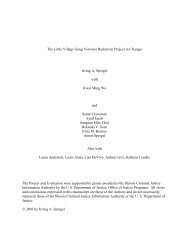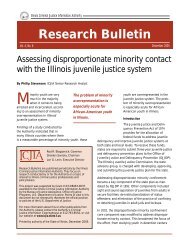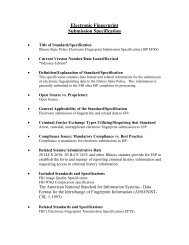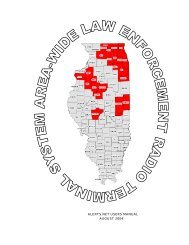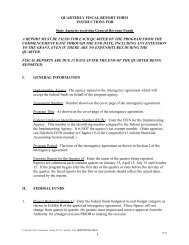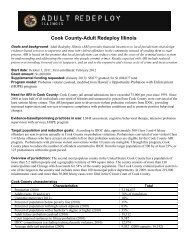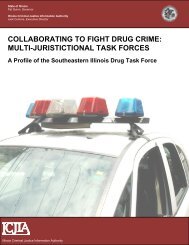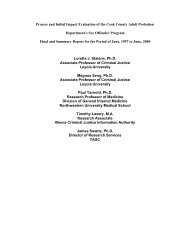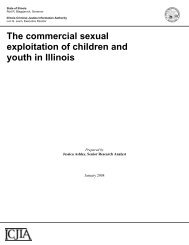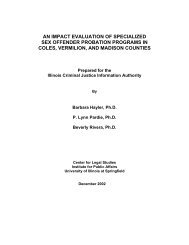policies and procedures of the illinois criminal justice system
policies and procedures of the illinois criminal justice system
policies and procedures of the illinois criminal justice system
Create successful ePaper yourself
Turn your PDF publications into a flip-book with our unique Google optimized e-Paper software.
If <strong>the</strong> judge, after hearing, determines that a defendant is fit to st<strong>and</strong> trial, <strong>the</strong> court process will<br />
proceed even if <strong>the</strong> defense continues to contest fitness. If an individual is found unfit to st<strong>and</strong><br />
trial, he or she will <strong>the</strong>n be rem<strong>and</strong>ed by <strong>the</strong> judge to <strong>the</strong> Illinois Department <strong>of</strong> Human Services<br />
Division <strong>of</strong> Mental Health (DMH). DMH will <strong>the</strong>n make <strong>the</strong> determination as to what services or<br />
treatment he or she needs in order to be fit to st<strong>and</strong> trial. An individual must be made fit within<br />
one year <strong>and</strong> <strong>the</strong> services may be inpatient or outpatient.<br />
If an individual is not determined fit to st<strong>and</strong> trial after one year, DMH will report to court<br />
whe<strong>the</strong>r he or she remains unfit but is making progress towards fitness or if fitness cannot be<br />
achieved. If <strong>the</strong> defendant is deemed unfit to st<strong>and</strong> trial <strong>and</strong> unable to achieve fitness, <strong>the</strong> state<br />
may drop charges with prejudice, pursue a civil commitment, or <strong>the</strong> case may proceed to a<br />
discharge hearing.<br />
During <strong>the</strong> discharge hearing, <strong>the</strong> judge may find <strong>the</strong> individual not guilty by reason <strong>of</strong> insanity,<br />
not guilty, or not acquit <strong>the</strong> individual. If <strong>the</strong> judge does not acquit him or her <strong>and</strong> DMH believes<br />
he or she can achieve fitness, <strong>the</strong> judge can order a term <strong>of</strong> extended treatment. Statutory<br />
limitations exist governing how long an individual may remain in extended treatment based on<br />
<strong>the</strong> <strong>of</strong>fense committed [725 ILCS 5/104-23]. Appendix B provides a flowchart <strong>of</strong> <strong>the</strong> process for<br />
individuals found unfit to st<strong>and</strong> trial.<br />
Findings regarding defendant’s mental condition at <strong>the</strong> time <strong>of</strong> <strong>the</strong><br />
<strong>of</strong>fense<br />
Not guilty by reason <strong>of</strong> insanity<br />
A defendant may assert an affirmative defense <strong>of</strong> not guilty by reason <strong>of</strong> insanity. This<br />
affirmative defense asserts that <strong>the</strong> defendant’s mental state at <strong>the</strong> time <strong>of</strong> <strong>the</strong> <strong>of</strong>fense results in<br />
his or her lacking substantial capacity to appreciate <strong>the</strong> <strong>criminal</strong>ity <strong>of</strong> his or her act [720 ILCS<br />
5/6-2]. If <strong>the</strong> defendant is found not guilty by reason <strong>of</strong> insanity, he or she shall be ordered to <strong>the</strong><br />
DMH for an evaluation, ei<strong>the</strong>r inpatient or outpatient, to determine whe<strong>the</strong>r he or she is in need<br />
<strong>of</strong> mental health services. If <strong>the</strong> evaluation is completed on an inpatient basis, during this period<br />
<strong>the</strong> defendant will remain held in secure custody until <strong>the</strong> appropriate placement determination<br />
has been made, at which time <strong>the</strong> defendant will be transported to <strong>the</strong> designated facility [730<br />
ILCS 5/5-2-4]. Appendix C provides a flowchart <strong>of</strong> process for individuals found not guilty by<br />
reason <strong>of</strong> insanity.<br />
Guilty but mentally ill<br />
Illinois also permits a trial to result in a finding or verdict <strong>of</strong> guilty but mentally ill. Such a<br />
finding does not result in an acquittal but ra<strong>the</strong>r, is treated as a finding <strong>of</strong> guilty as <strong>the</strong> name<br />
implies. The defendant is sentenced just as in any o<strong>the</strong>r case <strong>and</strong> may receive ei<strong>the</strong>r probation,<br />
conditional discharge or a term <strong>of</strong> imprisonment. In such event, <strong>the</strong> defendant is to be provided<br />
mental health services <strong>and</strong> treatment but still must serve out his or her sentence as does any o<strong>the</strong>r<br />
convicted person.<br />
22



